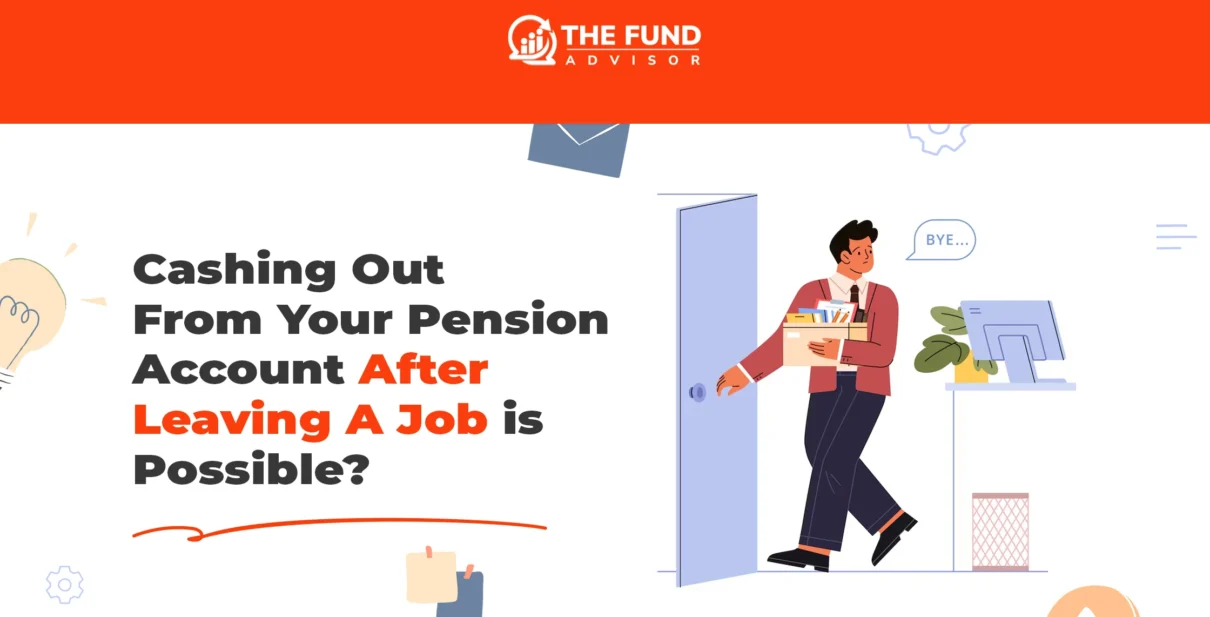Leaving a job means the individual is going to get a new hype with salary and work-life environment, or just switching from the old position. But this transition often includes financial as well as career-related aspects to focus on. One critical question that many employees face: Cashing out pension after leaving job is possible? While this looks like it is simple to withdraw all the funds but sometimes it carries legal, financial, and tax-related issues that need to be considered. Let’s discuss various implications and considerations surrounding cashing out a pension.
How A Pension Works When You Leave A Job?
First, it is important to know how pensions work if you quit your job. Pension is a very crucial part of retirement life. It is a financial tool used by employers (mostly) for their employees. This makes a reliable source of income for their post-employment life. Penion and retirement savings are very crucial part of one’s life. In the years, where doing work becomes challenging due to physical incapabilities.
But have you ever wondered what happens with your pension when you leave a job? This depends on various factors :-
- Vesting Status : Vesting is the threshold after which the employee gains control over the saved amount. This includes the employer’s contribution to the pension. If the pension is completely vested, then the employee legally can make any withdrawal. But if not, then only the amount saved by the employee’s contribution will be accessible.
- Type of Pension Account : Also, it depends on the type of account because the terms and conditions may differ.
- Employer’s Policy : The working of pension withdrawals and transfers also depends on the company’s policy.
Can You Cash Out A Pension After Leaving A Job?
Yes, cashing out pension after leaving job is possible, but it depends on the type of pension account and the vested status. In the case of a defined benefits pension, the plan provides a guaranteed monthly income to the person even after leaving the current job. This income can be in the form of a lump sum or some other payout options available in the pension account.
If we talk about a defined-contribution pension like a 401(k) retirement savings account, you can get more flexibility. The funds saved in this account can be accessed by the account holder after the vesting period. The vesting period means the person has worked long enough to claim full ownership over their pension account.
There are generally three ways to claim a defined-contribution pension account :-
- Cash Out : In this, the person will directly cash out from the savings account. This causes early penalties and usual tax implications.
- Roll Over To An IRA : The account holder can roll over the funds of this retirement saving account into an Individual Retirement Account (IRA). Which prevents cash-out pension early withdrawal penalties.
- Transfer Funds : The individual can transfer the entire funds of the old retirement account to the new employer’s retirement savings account.
So, if you’re asking how to collect a pension from your former employer, the answer will same as before.
Pension Status After Leaving A Job
When you leave a job, your pension doesn’t just vanish. It is always an asset to you, and you can claim this in various ways. Meaning cashing out pension after leaving job is not a big deal, but requires proper planning and execution. But it is important to consider all situations related to this phase.
Your pension will always remain intact, and you can withdraw it anytime if it is fully vested and you have worked enough to claim it. Pension is a asset which people earn throughout their lifetime. For the purpose of future financial safety, pension plans are essential.
In a defined benefits plan, you can get a guaranteed monthly retirement benefit or a lump sum of the vested amount.
Cashing out from a pension can cause early withdrawal penalties and tax implications that can directly affect the withdrawable amount. Meaning the amount you get will be lower than the actual savings. Always consider rolling over into a new retirement savings account to avoid such complications.
Points To Consider Before Withdrawing Your Pension
As we have seen that cashing out from a pension after leaving a job is possible, but there are some losses or points that need to be focused on. Before leaving, consider these points :-
- Taxes : Generally, pension distributions are considered as ordinary income, which is taxable. So, withdrawal from a pension account always consists of tax implications.
- Penalties : Almost every pension or retirement savings account charges a penalty (can be 10% of the withdrawal amount), which can reduce the pension amount.
- Reduces Retirement Savings : Early withdrawals can reduce your retirement savings potential, which leads to a low pension income.
It is always suggested to roll over the current pension account into an IRA or the new employer’s pension account to avoid these money complications.
What Happens To A Vested Pension Plan?
Vesting is very important for getting full control over your retirement savings account. This is a very good feature of all pension accounts because with this, a decent amount of savings can be made. These guidelines or limitations are set by the Internal Revenue Service (IRS) to ensure an optimized workflow transition.
It is important to contact your pension or HR department to get the statement summary of your pension account. Many people forgot their previous vested pension savings account, but they need to know that the pension they have saved till now will always be theirs.
Tax Implications For Cashing Out Pension After Leaving Job
We all know that the pension is considered a normal income, which contains tax implications. So, the question of whether cashing out a pension is taxable is answered. Taxes are usually the same as the state of the federal income tax department applies to all other income and expenditure.
Also, any large withdrawal from a pension account can cause a significant tax bracket. Also, if you are under the age of 59½ years, then a 10% early withdrawal penalty will be applicable with the taxation mentioned. And if you withdraw funds from a pension account and then again open a new pension account. Then you will need to face double taxation. The best practice is to simply roll over or transfer the current pension account funds into a new account that doesn’t charge any taxes or penalties.
When Cashing Out Might Make Sense?
However, cashing out pension after leaving job in the form of direct withdrawal or hardship withdrawals is not what is advised. But there are some major reasons that force and cashing out from a pension account sounds legit. Like, if you are facing serious debt and credit issues that can harm you in some ways, then to neutralize the current situation, you can withdraw funds from a pension account.
Also, like in the case of buying a primary house that is also an appreciating asset, the pension withdrawal can be valid. Before making any decision, always try to explore some other options for instant money then disturbing a retirement savings account.
Impact of Inflation On Deferred Pension Value
If you are switching, you job leaving your current job. Then you need to roll over the previous pension account into a new one. This will not only prevent you from encountering penalties and taxation. But also give you a chance to invest the vested savings using new approaches rather than cashing out pension after leaving job. There is a possibility that the current savings amount will not be sufficient for future inflation, which is definite.
So, without draining the retirement saving, an individual needs to roll over the funds. Then again make a new investment strategy to maximize the expected pension income to its maximum potential.
Alternatives to Cashing Out a Pension in Immediate Fund Needs
Cashing out your pension after leaving a job seems very tempting, but it comes with future disadvantages. In times of immediate need for funds, it is very easy to get funds from a pension plan. You can either leave the funds in the pension account. However, understanding tax implications, penalties, and a reduction in retirement savings is essential. So, instead of cashing out directly, there are some ways that can help you to fulfil your current financial needs while the pension remains intact.
It is advised to not make any hardship distirbution from the pension funds. So, if there is any financial emergency for which you want funds then here are some smart alternatives to consider:
- Loan Again Pension Plan: There are many pension plans that allow borrowing as a loan against the accumulated funds. This can be an effective way to get funds for your needs while the pension will remain safe. Also, after paying the instalments, the pension funds are again deposited.
- Partial Withdrawals: In the case of genuine financial crises, you can withdraw a part of the total pension funds. This will help in managing the money needs, and the pension will be there, not full, but still, some amount will be there. And after some time, you can even try to contribute a higher amount to the pension account to gain the maximum potential of retirement savings again.
- Systematic Withdrawal Plan (SWP): After retirement, if you need money on a regular basis, then going for a SWP can be helpful. With a fixed regular income which is debited from the pension funds, the financial stability is maintained while the pension will last for a long time.
Pursuing these alternative ways can help in maintaining the pension funds for a long time, while the timely financial needs are met. Always take a thorough examination of the fund need before making any distribution from the retirement funds.
Conclusion :-
Cashing out pension after leaving job is possible, but with some regulations and constraints. There are various ways to cash out, like rolling over, hardship withdrawals, and transferring it to the new employer’s pension program. But to get complete control over your pension account, you need to ensure that the pension is vested or not. Only after this is the distribution of the pension possible. Consult your HR department to clarify all concerns before making any decisions.
If you find this article helpful, then please follow us and share it with your family and friends.
Frequently Asked Questions
Can I close my pension and take the money out?
If your pension account is fully vested, then you can cash out from your pension savings, including the employer’s contribution. But if you are under the age of 59½ years, then you need to face a 10% early withdrawal penalty with the general tax implications.
Is it wise to cash out your pension?
If the cash-out is early, then it is risky. Instead of cashing out, you can roll over the current pension account into an IRA to avoid the charges and penalties. Also, if you need funds, you can go for loan on the vested pension funds. This will help in managing the current financial crises while repayments will again deposited in the pension plan.
What happens to my cash balance pension if I quit?
No impact will be seen on your pension account after you leave. Your money is always yours, and you either withdraw or roll over the current retirement savings account.
Can my employer take away my pension?
Your employer cannot take away your pension because it is the money you saved. But if the pension account is not vested, then you cannot withdraw the employer’s contributions. However, the contribution made by you are always yours.





